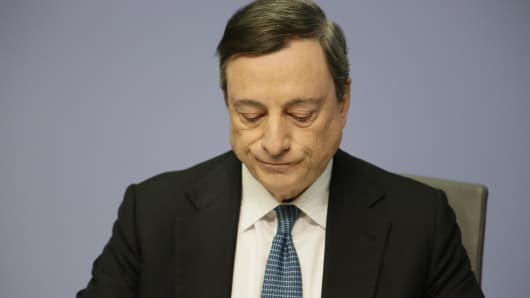A lower currency in Europe has given some protection to a disappointing set of corporate earnings this quarter as a weaker euro has provided a tailwind to euro-denominated exports. Fund managers too may be left reviewing equity exposures if the euro stabilizes or marks higher.
"The sectors that have performed well in European equities have been driven by translation effects on currency and an export-driven model, Draghi is now focusing his actions on credit easing in the euro zone fairly aggressively that should boost domestic demand, much as you've seen in the US," said Stephen Jones of Kames Capital.
"You have to be careful about where you are positioned in the markets as the theme changes from currency manipulation to domestic demand," Jones said.
Draghi continued to overtly paint negative interest rates in a positive light at last week's ECB press conference, but his reluctance to keep the option of more rates cuts alive is a nod to the naysayers about such experimental policy. Investment bankers and retail bankers freely acknowledge a skill set deficit in managing banks in a world of negative deposit rates.
The washout from ECB blowing up the future pathway for negative interest rates could make investors question the scope for future easing in Japan. Many already doubt whether the Bank of Japan can achieve anything positive with negative rates, hence the abnormal reaction of yen appreciation to extra stimulus.
Japan was a somewhat favored trade for fund managers allocating money in 2016, and with the correlation between the yen and Tokyo stock market still high, the result may be standstill at best for Japanese equities.
"Until we see clarity on BoJ and the Federal Reserve it's hard to see how Japanese equities go higher because of the yen strengthening." said Dwane of Allianz Global Investors.
All eyes are now on the Fed's Open Market Committee meeting this week. But remember currency wars have caused a lot of market casualties. If there's any reversal - if that's what we are witnessing -- there could be collateral damage.
Karen Tso is an anchor on Squawk Box Europe, CNBC and you can follow her on Twitter @cnbckaren.






